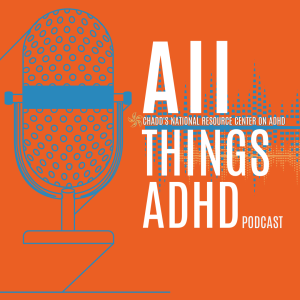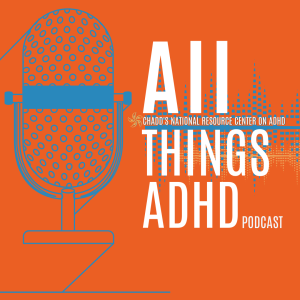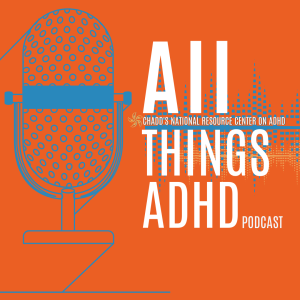Episodes

Saturday Oct 17, 2020
Diagnóstico y Tratamiento de TDAH
Saturday Oct 17, 2020
Saturday Oct 17, 2020
¿Está buscando información sobre el diagnóstico y el tratamiento de TDAH? Es importante entender que es un diagnóstico comprensivo y cómo es diferente para la comunidad Hispana y Latina. Un diagnóstico con un profesional adecuado ayuda entender el TDAH de su hijo y la ayuda que necesita. María Acosta habla sobre las dificultades para la comunidad Hispana, la diferencia con la comunidad americana, y estrategias para padres.
Objetivos:
Aprende desafíos de salud mental en la comunidad Latina
Cómo las diferencias culturales afectan a los niños y al TDAH
Entiendo las limitaciones para el diagnóstico de TDAH en niños Latinos
Aprende que significa un diagnóstico comprensivo y los diferentes profesionales adecuados
Aprende los mejores tratamientos para el TDAH
Estrategias para padres con niños con TDAH

Thursday Sep 10, 2020
Online Learning for Children with ADHD
Thursday Sep 10, 2020
Thursday Sep 10, 2020
Podcast Transcript coming soon.
Laci CulbrethAssistant Principal of Lower School
Due to the impact of the COVID-19 pandemic, many schools have transitioned to remote learning or hybrid learning. For learners with ADHD, there are many changes that can make it difficult to succeed at home. Parents and teachers are discovering new ways to help students learn to the best of their abilities. Laci Culbreth discusses the difficulties of ADHD symptoms while learning from home and talks about her experience as a teacher. She provides suggestions for parents on how to help their children with ADHD at home. She also discusses strategies teachers can use to increase support for students with ADHD through remote learning.
Objectives
Learn strategies for parents on helping children with ADHD at-home learning
Learn strategies for making work manageable for ADHD learners
Identify ADHD symptoms that can impact a student while learning from home
Learn strategies and tools for teachers to help students and parents through remote learning
Understand how accommodations can be implemented remotely

Tuesday Sep 01, 2020
Is My High School Student Ready for College? Q&A
Tuesday Sep 01, 2020
Tuesday Sep 01, 2020
Podcast Transcript: Is My High School Student Ready for College?
Ari Tuckman, PsyD, MBA
Ari Tuckman, PsyD, MBA, is the author of Understand Your Brain, Get More Done, More Attention, Less Deficit, and Integrative Treatment for Adult ADHD. He is a psychologist in private practice in West Chester, Pennsylvania, a former member of CHADD’s board of directors and co-chair of its conference committee.

Tuesday Sep 01, 2020
Helping Your Young Adult Become Independent Q&A
Tuesday Sep 01, 2020
Tuesday Sep 01, 2020
Podcast transcript: Helping Your Young Adult Become Independent
Ari Tuckman, PsyD, MBA and Stephanie Sarkis, PHD

Thursday Aug 06, 2020
What Are My Child’s 504 and IEP Rights for Distance Learning?
Thursday Aug 06, 2020
Thursday Aug 06, 2020
Podcast Transcript: https://chadd.org/podcasts/guidance-for-uncertain-times-what-are-my-childs-504-and-iep-rights-for-distance-learning/
Summary: Due to the impact of COVID-19, many schools are having to change from face-to-face teaching to remote learning or even a hybrid environment. For students with ADHD who required classroom accommodations, whether through a 504 plan or an IEP, will the same guidelines apply in each learning situation? Dr. Jeffrey Katz gives parents insight into the child’s rights to educational accommodations for the 2020-2021 school year.
Jeffrey Katz, PhD: Dr. Katz is a clinical psychologist in private practice in Virginia Beach, Virginia. He is presently the Co-Chair of CHADD’s Public Policy Committee, serves on the Professional Advisory Board and is a past member of the Board of Directors. Dr. Katz specializes in the evaluation and treatment of children, adolescents and adults with an emphasis on ADHD as well as other behavioral and learning issues. In addition, Dr. Katz frequently attends school meetings, bringing his knowledge of ADHD, learning disabilities, and school-based interventions, together with his knowledge of educational regulations, to ensure that students receive the support they need. He also serves on the Disabilities Advisory Committee of Tidewater Community College.

Thursday Aug 06, 2020
Am I Depressed?
Thursday Aug 06, 2020
Thursday Aug 06, 2020
Podcast Transcript: https://chadd.org/podcasts/guidance-for-uncertain-times-am-i-depressed/
Summary: Millions of adults, children and families have faced new and unexpected changes to their lives during this time of uncertainty. Staying at home with the stress of the pandemic could lead to symptoms of depression. Some individuals with ADHD who already had coexisting depression could experience increased symptoms because of the pandemic. Dr. Eugene Arnold provides information about the symptoms of depression in children and adults with ADHD. He discusses treatment options including medication management, behavior therapy and complementary interventions.
L. Eugene Arnold, MD, MEd: Dr. L. Eugene Arnold is Professor Emeritus of Psychiatry at Ohio State University, where he formerly was the Director of the Division of Child and Adolescent Psychiatry and Vice-Chair of Psychiatry. He is a co-investigator in the OSU Research Unit on Pediatric Psychopharmacology. He has 45 years of experience in child psychiatric research, including the multi-site NIMH Multimodal Treatment Study of Children with ADHD (“the MTA”), for which he was executive secretary and chair of the steering committee. For his work on the MTA he received the NIH Director’s Award. A particular interest is alternative and complementary treatments for ADHD. His publications include 9 books, 70 chapters, and more than 300 articles. He is also CHADD’s Resident Expert.
Learning Objectives: 1. Recognize the symptoms of depression in children and adults 2. Learn how depression can impact someone with ADHD 3. Find out the treatment options for depression and ADHD 4. Learn about medications for depression and ADHD and potential barriers 5. Find out which professionals can treat ADHD with coexisting depression

Thursday Jul 23, 2020
Overcoming Myths and Mistrust About ADHD in the Black Community
Thursday Jul 23, 2020
Thursday Jul 23, 2020
African American parents often question the validity of their child’s ADHD diagnosis. For them, past experience with the medical community did not always include appropriate evaluation and correct diagnosis. What steps should they take to ensure their child is getting a proper assessment? Psychologist Nekeshia Hammond explains what parents need to know about ADHD and the elements of a comprehensive evaluation. She gives insight into the common myths about ADHD in the Black community and explains why healthcare professionals and educators need culturally competent training.
Featured guest:
Nekeshia Hammond, PsyD
Nekeshia Hammond, PsyD, is the founder and owner of Hammond Psychology and Associates, PA. She is an author, speaker, and authority -on child psychology, with a specific mission to support parents of children coping with ADHD.
https://hammondpsychology.com/dr-nekeshia-hammond/

Thursday Jul 09, 2020
Guidelines for ADHD Treatment, featuring Max Wiznitzer, MD
Thursday Jul 09, 2020
Thursday Jul 09, 2020
Podcast transcript and description are coming soon.
A comprehensive treatment approach for children and adolescents with ADHD will ensure the greatest opportunities for success. After your child or teen has completed a thorough assessment process by an ADHD-trained mental health or healthcare provider, you will be informed of the key areas of concern that affect your child’s functioning. These areas can include school challenges, self-esteem or anger management issues, co-occurring disorders such as depression or anxiety, any learning concerns, and peer and family relationships.
Max Wiznitzer, MD, gives guidance to help parents understand treatment options that are most suited to the unique needs of your child and family.

Wednesday Jul 01, 2020
Building Better Executive Function Skills
Wednesday Jul 01, 2020
Wednesday Jul 01, 2020
Podcast Transcript coming soon.
How does executive functioning relate to ADHD? How can you help children and teenagers build better executive function skills? Cooper-Kahn shares insight, practical strategies, and interventions you can use in your daily life.
Joyce Cooper-Kahn
Joyce Cooper-Kahn, PhD, is a clinical child psychologist and author who specializes in direct services and consultation for youth, families, and schools dealing with ADHD and executive functioning weaknesses.

Tuesday Jun 16, 2020
Treatment of Complex ADHD
Tuesday Jun 16, 2020
Tuesday Jun 16, 2020
Podcast Text Transcript
Complex ADHD is ADHD that co-occurs with one or more conditions that can complicate the symptoms of ADHD. Two-thirds of children with ADHD have at least one coexisting condition. These coexisting conditions may include oppositional defiant disorder (ODD), anxiety disorders, depression, learning disorders, autism spectrum disorders, intellectual disability, and tics (Tourette Syndrome).
Treatment of complex ADHD begins with treating the condition that is most prominent and may involve behavior therapy, parent training, or medication. When medication is used, stimulants are the first line of treatment. Non-stimulant medications may be considered when stimulants do not work. If learning disorders coexist with ADHD, academic interventions are needed.
In this ADHD 365 podcast, Dr. Tanya Froehlich offers expert information on complex ADHD, focusing on the conditions that often coexist with ADHD. She discusses the recommended treatments based on research for each of the conditions, and the options available when first-line treatments don't work.
Tanya Froehlich, MD, MS.
Dr. Tanya Froehlich is a professor of pediatrics at Cincinnati Children’s Hospital Medical Center in the Division of Developmental and Behavioral Pediatrics. She is a developmental-behavioral pediatrician and an ADHD clinical specialist. Dr. Froehlich serves on the national ADHD clinical practice guideline development committees for both the American Academy of Pediatrics and the Society for Development and Behavioral Pediatrics.
Learning Objectives:
What is complex ADHD?
Conditions that often coexist with ADHD
Recommended behavioral treatment including behavior therapy and parent training
Treatment for coexisting learning disorders
Medication options available for complex ADHD



